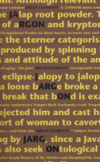Jargon
The etymology of the word jargon is unclear—historians of language aren’t sure of its derivation—which is ironic, considering what it means, and marvelously appropriate. In a pure sense, it simply connotes a specialized vocabulary related to a specific discipline or profession, though it’s common to hear the term used to refer, in a negative sense, to language that is considered impenetrable or deliberately opaque. I love the word and the idea of jargon as the title of a book of poems and prose poems. At the same time, I would say that Jargon is, happily, not impenetrable (as in incomprehensible), and while it reflects a unique and quirky personality and intelligence, it is not so much deliberately opaque, as deliberately and persistently original, and sometimes wonderfully confusing (a confusion I ended up not minding in the least).
The etymology of the word jargon is unclear—historians of language aren’t sure of its derivation—which is ironic, considering what it means, and marvelously appropriate. In a pure sense, it simply connotes a specialized vocabulary related to a specific discipline or profession, though it’s common to hear the term used to refer, in a negative sense, to language that is considered impenetrable or deliberately opaque. I love the word and the idea of jargon as the title of a book of poems and prose poems. At the same time, I would say that Jargon is, happily, not impenetrable (as in incomprehensible), and while it reflects a unique and quirky personality and intelligence, it is not so much deliberately opaque, as deliberately and persistently original, and sometimes wonderfully confusing (a confusion I ended up not minding in the least).
As a book (object), Jargon presents its own structural jargon, so to speak. The pages are un-numbered (not a single page number in the book). The Table of Contents, also unlabeled as such, divides the poems into 6 sections, each numbered, rather than titled, in the same format (a colon, two spaces, the number in bold) and the numbers have no obvious significance (do they represent their order in a series outside of this book? are they a form of “jargon” as in a set of symbols known only to certain insiders?). The titles of the pieces contained in each section appear in a dual format, the title underneath which appears, in italics, a line from the poem, but not the first line. Every piece in the book begins on the right side of the page; with the title on the left-hand page opposite.
“: 55,” the first section, begins with an untitled poem, fragments of which re-appear throughout the book. Jargon is composed largely of prose poems, so it is clearly important that the book is framed by a poem that, while not traditional in form, is not prose poetry. I cannot render the form here, so my quotation of the opening “lines” is not faithful, unfortunately, to the poem, which spaces the words out singly across the page as if they were floating. Nonetheless, I must quote the opening idea, “forgot things to speak” or perhaps “forgot things speak to” depending on how one approaches (reads) the space.
It seems to me that it’s the work of the rest of the book to speak these forgotten things or make into things this forgotten speech. Clements is a sort of philosopher of forgotten meanings (is that a kind of jargon?) and a maker of new philosophies. And so in the very next poem in this first section, “A Basket of Brains,” he begins: “What you might ask is enlightenment? Does it happen in the brain? Is it a meeting of science and faith or the erasure of both?” These are some of Jargon’s major preoccupations: science, religion, what is erased (forgotten), how we think or understand or make meaning (the brain), how history may be interpreted (the Enlightenment as an era).
Rather than keep us from understanding (jargon as “babble” or insider speak), Clements offers up insight after insight (enlightenment?):
“After all the worry, who wants to spend another minute of our middle years on work?” (from “Xeno’s Paradox”)
“That you’ll never get an answer to anything starts to come across as funny” (also from “Xeno’s Paradox”)
“That’s the appeal of being somewhere you’re not and having the freedom to make your own content” (from “Tale with Six Bridges”)
“Sadness is a kind of light” (from “Chet Baker”)
“Position is where you find it.” (from “Still Life with Supernova”)
“The opposite of magic is barbarism.” (from “The Great Vérités;” a title that suggests that Clements does, indeed, mean to enlighten us).
Clements can be sensitive (“And there actually may be something to that ache behind your eye.”); hopeful (“At least it’s December. Something is on its way.”); poetic in the emotional sense of the term (“That’s all there is to extending welcome, even if you believe another sky is on the way.”); funny (“as surely as I am the ludicrous Sigmund Freud”); sarcastic (“a liberal was once a real person”); or surprisingly sincere (“Everyone refuses to believe for a time that they bend the space they inhabit.”) Unifying these—and other moods/modes—is a distinct, original, and highly appealing voice shaping unusual pages with exceptionally astute insights.
A really fine book of poetry—like this one—ultimately, defies explanation/explication. Isn’t every good work of poetry, then, a sort of jargon?





